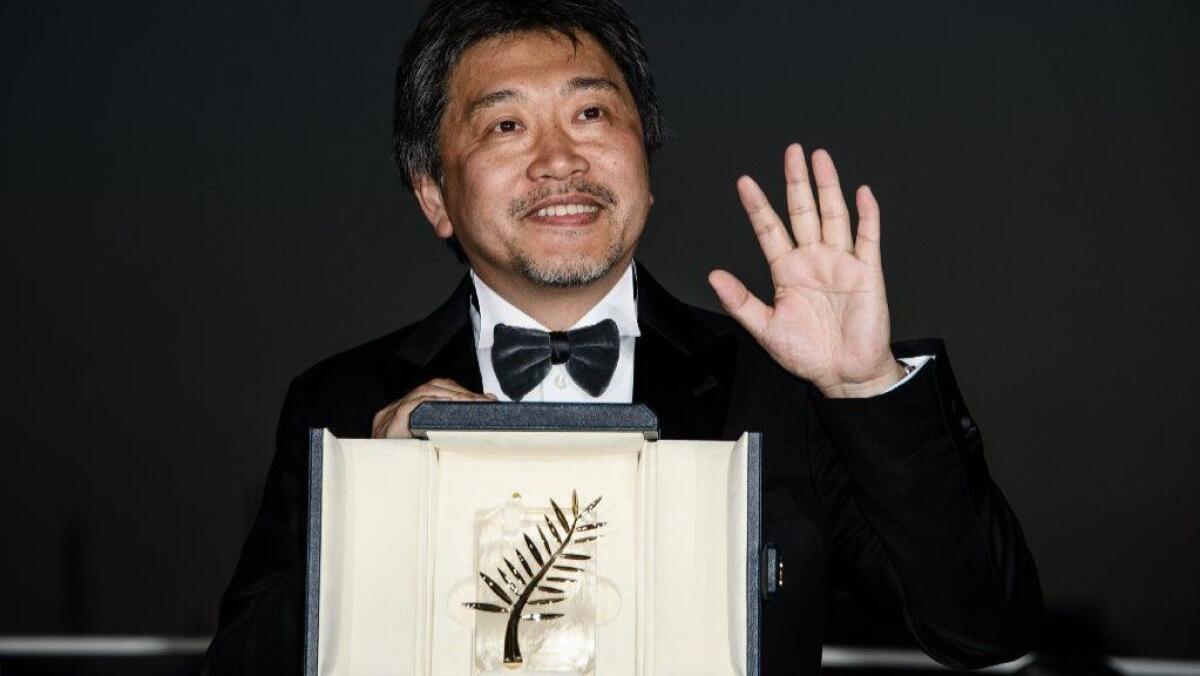‘Shoplifters’ wins Palme d’Or as Spike Lee takes second place at the 2018 Cannes Film Festival

- Share via
Reporting from CANNES, France — He sat in his seat, perfectly still, as if he couldn’t believe the news. And he was not the only one surprised, as master Japanese director Hirokazu Kore-eda was the unexpected but very welcome winner of the Cannes Film Festival’s Palme d’Or for his “Shoplifters.”
Kore-eda has been at the festival several times before, most recently with films such as “Like Father, Like Son,” “After the Storm” and “Our Little Sister,” but his brand of heartfelt, exquisitely modulated humanism is not the kind of flashy filmmaking that usually wins the big prize.
This year, Kore-eda’s story of a family of small-time grifters whose decision to shelter an abused child causes unforeseen complications clearly touched the jury. Jury member Kristen Stewart even put her arm protectively on his shoulder during the group photo with the winners.
“The Palme d’Or, it has to be something where all the elements come together, where the acting is extraordinary, the direction is extraordinary, where the mise-en-scene is profound and deep, the cinematography — where all those elements are seamlessly interwoven,” said jury president Cate Blanchett in the post-awards news conference.
“In the end we were bowled over by how the performances were interwoven with the directorial vision. We’re not here to judge, we’re here to choose. It’s quite painful, but it’s an extraordinary film,” she said.
Also waiting a long time for his honor was American director Spike Lee. His sixth trip to Cannes earned him the Grand Jury Prize, the festival’s second-most important honor, for “BlacKkKlansman.”
Lee introduced Barry Alexander Brown, editor of all of Lee’s films since 1988, including this year’s submission, based on the factual story of a 1970s black Colorado police officer who successfully infiltrated the Ku Klux Klan. The film, which also includes footage of last year’s Charlottesville, Va., riots and President Trump’s reaction, will be released this summer.
The director accepted the award “on behalf of the People’s Republic of Brooklyn” and said that when he is asked about the state of the world, he quotes the film title “The Year of Living Dangerously.” I repeat, ‘The Year of Living Dangerously.’”
Kore-eda’s victory was not the only surprise of the evening, which included the presentation of the first-ever Special Palme d’Or for “continuously stretching the bonds of cinema” to 87-year-old Jean-Luc Godard, whose hypnotic but mystifying “Le Livre d’Image” (“The Image Book”) was in this year’s competition.
Perhaps the biggest shock of the evening came from Italian actress-director Asia Argento, one of the ceremony’s presenters, who told a stunned black-tie audience by declaring that, “in 1997, I was raped by Harvey Weinstein here at Cannes. I was 21 years old.”
“This festival was his hunting ground, but Harvey Weinstein will never be welcome here again,” Argento said. “Even tonight, sitting among you, are those who have to be held accountable. You know who you are and, most important, we know who you are. We’re not going to allow you to get away with it at any longer.”
Best director went to Poland’s Pawel Pawlikowski for the gorgeous, atmospheric “Cold War.” His follow-up to the Oscar-winning “Ida,” this film is a tumultuous love story set on both sides of the Iron Curtain between 1949 and 1964.
“It’s the first time for a Polish film in a long time,” the director said. “It’s a piece of great news, and we need good news in Poland these days.”
The festival’s jury prize was awarded to Lebanon’s Nadine Labaki, one of three female filmmakers in competition, for “Capharnaum,” which depicts the horrors of life for neglected and exploited children.
Also following someone whose life is a litany of desperation and chaos was Sergey Dvortsevoy’s “Ayka,” which won the best actress prize for Samal Yeslyamova, playing a woman who abandons her newborn baby and searches hopelessly for work as a blizzard envelops Moscow.
Taking best actor for his work in Matteo Garrone’s “Dogman” was Marcello Fonte, who plays a put-upon dog groomer who finally has to fight back. The Italian actor was so stunned by his victory that he initially refused to take possession of his award after coming up on stage.
The festival jury split the best screenplay award between two very different films: Italy’s Alice Rohrwacher for “Happy as Lazzaro,” a gentle fable about the life of an innocent in a world of exploiters, and Iran’s “Three Faces,” co-written by Nader Saeivar and director Jafar Panahi, who is banned from making films in Iran and forbidden from travel by his government, and therefore was absent from the festival.
Accepting was Panahi’s daughter, who said that her father wanted to remember the late Iran director Abbas Kiarostami, who met him at the Tehran airport in 1995 to celebrate after Panahi won the Camera d’Or for best first film for his “The White Balloon.” It was a moving moment in an evening filled with them.
Times staff writer Justin Chang contributed to this report.
More to Read
Only good movies
Get the Indie Focus newsletter, Mark Olsen's weekly guide to the world of cinema.
You may occasionally receive promotional content from the Los Angeles Times.










